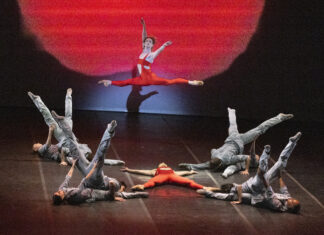A Kiev il ProEnglish Theatre è diventato un rifugio antiaereo. Dopo aver raccontato la storia del regista italiano Matteo Spiazzi torniamo in Ucraina. Siamo entrati in contatto con uno dei fondatori e insegnanti del piccolo teatro sorto in un seminterrato, che ora offre riparo ad artisti e abitanti del vicinato.
Cercare un luogo su Google Maps può dare l’impressione straniante di una vicinanza inattesa. Kiev, periferia est. Un viale di tigli, caseggiati lineari o torri, a tratti ingentiliti da dettagli e cornici neoclassicheggianti, identificano immediatamente certe architetture dell’area post-sovietica. Nel piano interrato di una palazzina c’è una scuola di teatro. Il ProEnglish Theatre è un piccolo spazio indipendente, propone spettacoli in inglese su testi anglosassoni – immaginiamo non si tratti di un luogo ordinario in Ucraina, come ci conferma Alex Borovenskiy, regista e cofondatore del teatro, che abbiamo raggiunto telefonicamente. In questi giorni il teatro è diventato un rifugio, e quando suonano gli allarmi le sale prove si riempiono di persone dai palazzi intorno. Pile compatte di libri proteggono le finestre.
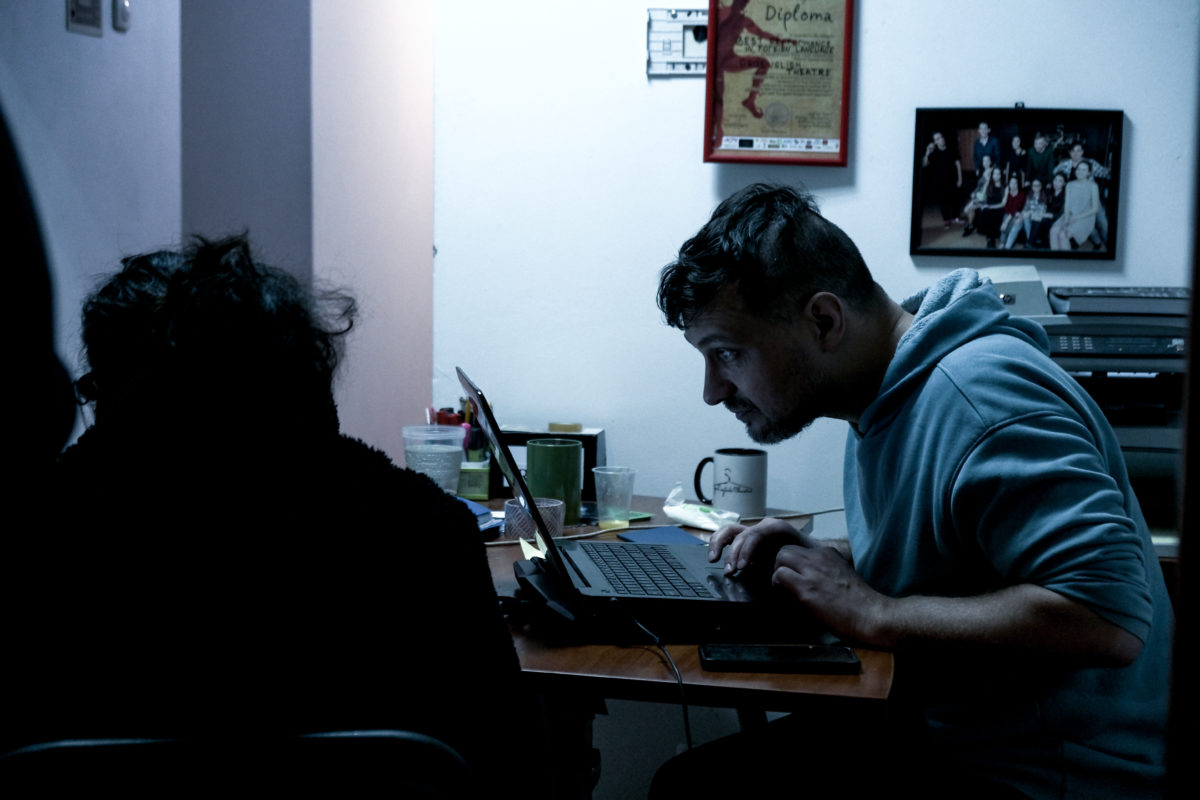 “C’erano anche dei bambini fino a qualche giorno fa, poi fortunatamente sono riusciti a lasciare Kiev e il Paese” dice Alex. “Ora ci sono attori e attrici della nostra compagnia come Alina Zievakova, Anabell Ramirez e Denis Kapustin, ma anche persone anziane e volontari. Le persone cambiano di giorno in giorno, ma si è creata una piccola comunità intorno a noi, e questo ci fa sentire uniti. Lo potremmo chiamare un Art-shelter.”
“C’erano anche dei bambini fino a qualche giorno fa, poi fortunatamente sono riusciti a lasciare Kiev e il Paese” dice Alex. “Ora ci sono attori e attrici della nostra compagnia come Alina Zievakova, Anabell Ramirez e Denis Kapustin, ma anche persone anziane e volontari. Le persone cambiano di giorno in giorno, ma si è creata una piccola comunità intorno a noi, e questo ci fa sentire uniti. Lo potremmo chiamare un Art-shelter.”
Abbiamo contatto Alex su segnalazione di Fabio Omodei, dell’Accademia Teatrale Sofia Amendolea di Roma. Riportiamo lo scambio trattenendo la durezza e l’orgoglio delle parole di Alex, che nel rispondere tiene sempre unita la propria identità a un senso di nazione. L’intento è, né più né meno, quello di gettare lo sguardo, vedere quello che accade in una piccolo teatro come i tanti che sorgono nelle cantine romane.
Come vi sentite quando suonano gli allarmi antierei?
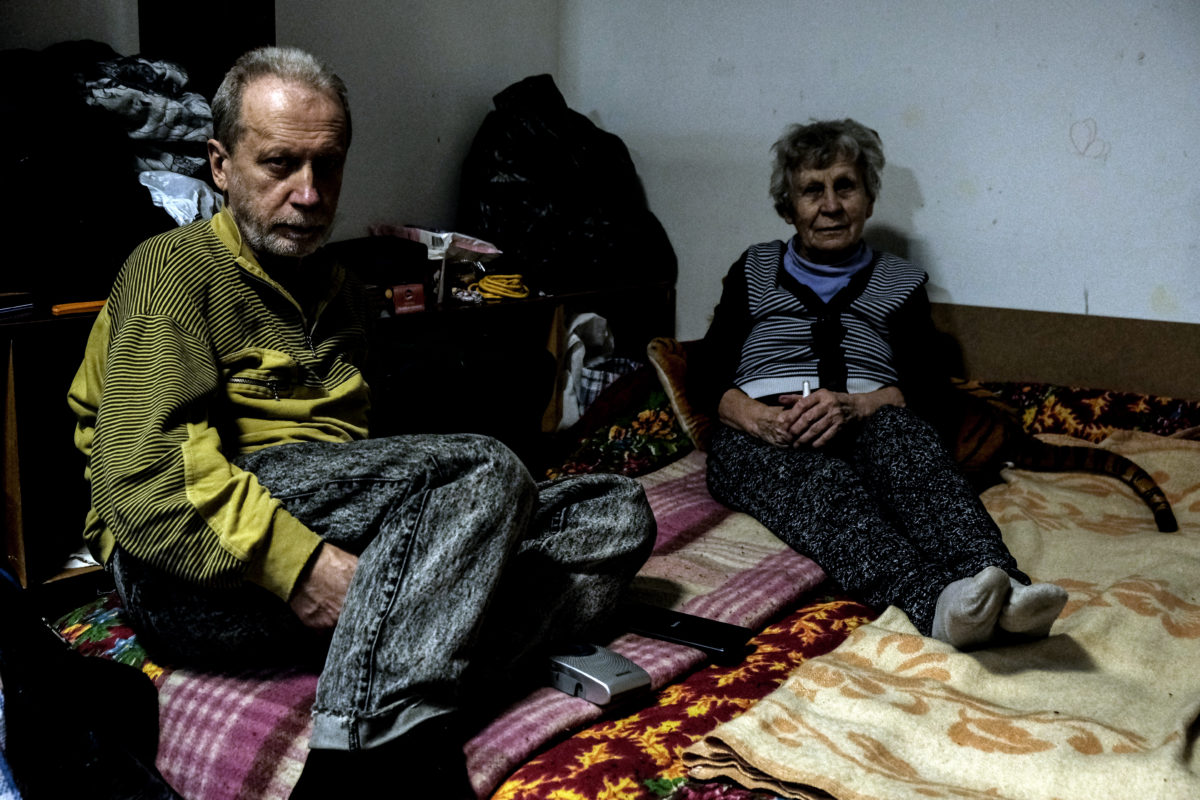 Gli allarmi suonano spessissimo, tutte le notti: ormai ci siamo abituati. Fino a pochi giorni fa, per fare la spesa dovevi rimanere a lungo in fila… un allarme era il modo migliore per saltarla! Ora invece l’abitudine fa sì che tutti restino lì. Scherzi a parte, questo è orribile. Non voglio che gli ucraini si abituino alla tragedia. Il volto della città intorno è già cambiato profondamente: le strade principali sono ostruite dai blocchi anti-carro o dalle barricate, si sentono esplosioni sempre più vicine, possiamo persino distinguere se si tratti di kalashnikov o mortai…
Gli allarmi suonano spessissimo, tutte le notti: ormai ci siamo abituati. Fino a pochi giorni fa, per fare la spesa dovevi rimanere a lungo in fila… un allarme era il modo migliore per saltarla! Ora invece l’abitudine fa sì che tutti restino lì. Scherzi a parte, questo è orribile. Non voglio che gli ucraini si abituino alla tragedia. Il volto della città intorno è già cambiato profondamente: le strade principali sono ostruite dai blocchi anti-carro o dalle barricate, si sentono esplosioni sempre più vicine, possiamo persino distinguere se si tratti di kalashnikov o mortai…
Cosa vi ha portato a usare il teatro come rifugio?
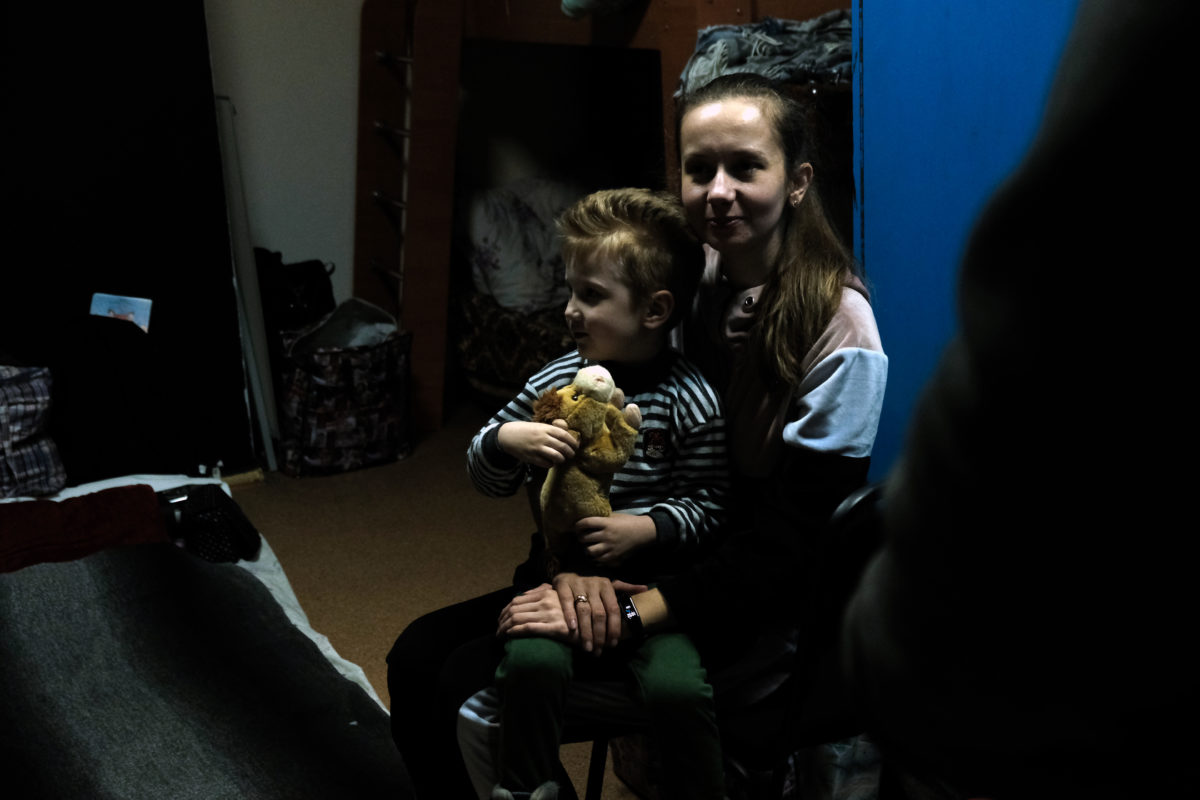 Sin dal primo giorno ho deciso di stabilirmi nell’unico posto in cui posso vivere e lavorare: il nostro teatro. Fortunatamente, come tanti spazi indipendenti, siamo in un piano interrato, e anche originalmente questi ambienti erano pensati come rifugio anti-aereo, per questo i vicini hanno cominciato a chiederci se avrebbero potuto ripararsi con noi. Ovviamente non eravamo preparati, ma siamo subito riusciti ad organizzarci. Alcuni di noi hanno chiesto di poter combattere nella cosiddetta “difesa territoriale”, ma le armi vengono consegnate solo a chi ha esperienza pregressa nell’esercito. L’alternativa è impegnarsi, come stiamo facendo, ad acquistare e consegnare cibo, farmaci, beni di prima necessità. È molto utile avere una macchina per poter accelerare le consegne.
Sin dal primo giorno ho deciso di stabilirmi nell’unico posto in cui posso vivere e lavorare: il nostro teatro. Fortunatamente, come tanti spazi indipendenti, siamo in un piano interrato, e anche originalmente questi ambienti erano pensati come rifugio anti-aereo, per questo i vicini hanno cominciato a chiederci se avrebbero potuto ripararsi con noi. Ovviamente non eravamo preparati, ma siamo subito riusciti ad organizzarci. Alcuni di noi hanno chiesto di poter combattere nella cosiddetta “difesa territoriale”, ma le armi vengono consegnate solo a chi ha esperienza pregressa nell’esercito. L’alternativa è impegnarsi, come stiamo facendo, ad acquistare e consegnare cibo, farmaci, beni di prima necessità. È molto utile avere una macchina per poter accelerare le consegne.
Sui social media è possibile seguire le vostre giornate, come se fossimo incredibilmente vicini. Quanto è importante raccontarvi attraverso questo filtro?
Le stories degli ucraini che fermano i tank a braccia alzate, che deridono i kalshnikov, che preparano molotov artigianali sono un fenomeno strano e potente. Creano l’immagine di un popolo e di una nazione che non era mai stata percepita come forte.
La rivoluzione arancione del 2004 e quella di Maidan del 2014 ci hanno restituito tutt’altro che l’immagine di un popolo debole, ma ci danno anche la percezione, insieme alla situazione nel Donbass, di un paese in guerra da tempo. Hai la stessa percezione?
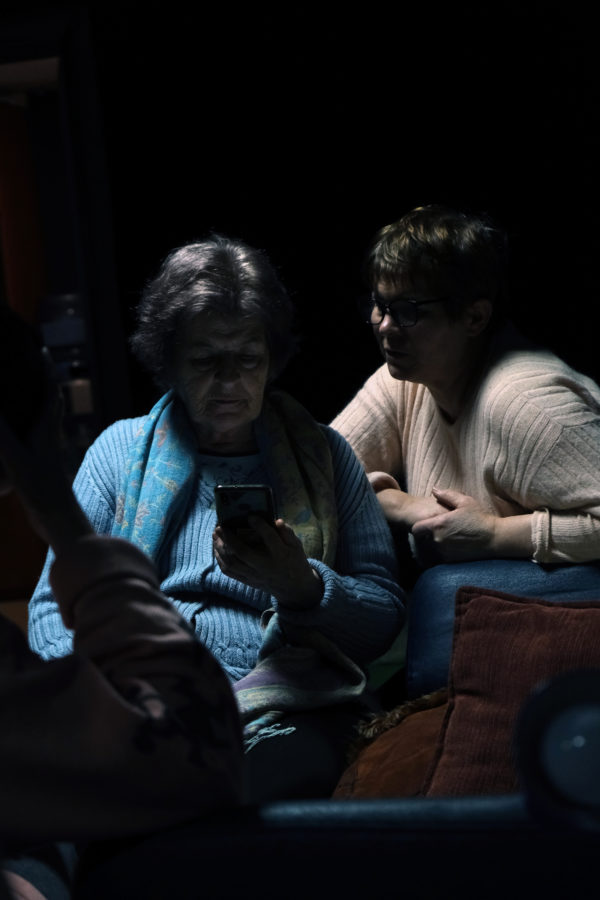 Personalmente no. Il flusso di informazioni da Luhans’k e Dontesk è sempre stato quotidiano, ma la percezione comune è quella di una “ferita congelata”. Di nuovo, l’abitudine è subentrata velocemente, come il bollettino dei soldati ucraini morti ogni settimana. A Kiev ci sentivamo sicuri, perché l’economia funzionava, i servizi funzionavano, i teatri funzionavano. Stava succedendo, ma non qui. Forse è questo quello che gli europei sentono ora? È questo che mi fa paura.
Personalmente no. Il flusso di informazioni da Luhans’k e Dontesk è sempre stato quotidiano, ma la percezione comune è quella di una “ferita congelata”. Di nuovo, l’abitudine è subentrata velocemente, come il bollettino dei soldati ucraini morti ogni settimana. A Kiev ci sentivamo sicuri, perché l’economia funzionava, i servizi funzionavano, i teatri funzionavano. Stava succedendo, ma non qui. Forse è questo quello che gli europei sentono ora? È questo che mi fa paura.
Sei in contatto con artisti russi?
Dal 2014 ho interrotto ogni contatto o collaborazione, ho rifiutato ogni invito. La stessa Crimea è diventata una sorta di “blurry white space” per me.
Di cosa senti di aver bisogno, ora, come artista?
Di continuare a parlare di arte, e che si sparga la voce su quello che facciamo. In questi giorni è stato bello parlare con compagnie da tutto il mondo: Chicago, Vienna, Roma… Naturalmente abbiamo anche bisogno di sostentamento, stiamo investendo le nostre risorse per l’acquisto di cibo, farmaci etc… Abbiamo aperto un canale Patreon per chi ci volesse sostenere. Come cittadino ucraino, invece, non posso non dirlo: sento bisogno di maggiore supporto in termini di aiuti militari. Kiev ormai è sotto assedio e, ne sono sicuro, Putin non si fermerà.
È possibile per te, ora, lavorare su quello che sta succedendo?
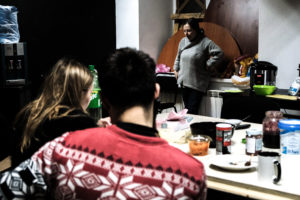 L’arte ha tempi lunghi, e per me si deve lavorare in retrospettiva. In questi giorni sto provando a iniziare a lavorare su uno spettacolo (vorrei lavorare su La ladra di libri di Markus Zusak). Sento di dover farlo, ma allo stesso tempo vi avverto qualcosa di sbagliato. Chi sono in tempo di guerra? Sono un artista, o è più importante che io sia un cittadino pronto a difendere la propria terra? Me lo chiedo ogni minuto, provo a tenere insieme le due cose.
L’arte ha tempi lunghi, e per me si deve lavorare in retrospettiva. In questi giorni sto provando a iniziare a lavorare su uno spettacolo (vorrei lavorare su La ladra di libri di Markus Zusak). Sento di dover farlo, ma allo stesso tempo vi avverto qualcosa di sbagliato. Chi sono in tempo di guerra? Sono un artista, o è più importante che io sia un cittadino pronto a difendere la propria terra? Me lo chiedo ogni minuto, provo a tenere insieme le due cose.
Traduzione in inglese. English
One can feel an unexpected sense of proximity while searching for remote places on Google Maps. So there we are, virtually walking along a lime trees-lined avenue in the eastern outskirts of Kiev. High-rise buildings or linear blocks of flats refined at times by neoclassical details and frames immediately identify certain post-Soviet landscape. In the basement of a building there is a theater school. The ProEnglish Theater is a small independent space, offering an English spoken billboard often based on Anglo-Saxon texts. We imagine this is not an ordinary place in Ukraine, as confirmed by Alex Borovenskiy, director and co-founder of the theater, whom we reached on the phone. The theater has become a shelter these days, and when the air raids go off the rehearsal rooms are filled with people from the buildings around. High stacks of books cover the windows. Dramaturgy shields from the war.
“There were some children until a few days ago, but fortunately they managed to leave the city” says Alex. “Now there are actors and artists of our theatre such as Alina Zievakova, Anabell Ramirez and Denis Kapustin, bust also elderly people and volunteers. People change from day to day, but a small community has been created around us, and this makes us feel united. We could call it an Art-shelter. “
We got in touch with Alex upon recommendation of Fabio Omodei, director of the Sofia Amendolea Theater Academy in Rome. We report our talk by preserving the harshness and pride of Alex’s words, in whose answers his personal and artistic identity is always kept together with a sense of nationality. Our intent is, neither more nor less, to cast a glance outside, through a complicated matter, to see what is going on in a small theater like the many spread in the Roman cellars, in the hope to understand potential strategy of proximity and actions to be taken.
How do you feel when the anti-aircraft sirens go off?
The air-raid go off very often, every night: by now we are getting used to it. Until a few days ago, you had to stand in line for a long time to do the shopping… an air raid was the best way to skip it! Now, however, habit makes everyone stay there. Seriously, this is awful: I don’t want Ukrainians to get used to the tragedy. The face of the city around has already changed tremendously: the main streets are blocked by anti-tank blocks or barricades, explosions are heard ever closer, we can even distinguish whether they are Kalashnikovs or mortars by now.
How did you get to turn your theater into a shelter?
From day one I decided to settle in the only place where I can live and work: our theater. Fortunately, like many independent spaces, we are in a basement, and even originally these environments were designed as an anti-aircraft shelter, so the neighbors began to ask us if they could take shelter with us. Obviously we were not prepared, but we were able to organize ourselves quite immediately. Some of us have asked to be able to fight in the so-called “territorial defense”, but the weapons are given only to those with previous experience in the army. The alternative is to commit, as we are doing, to purchase and deliver food, medicines, basic necessities.
It feels possible to be constantly updated about your situation by following you on the social media, as if we were incredibly close. How important is it to keep storytelling?
The stories of the Ukrainians who stop the tanks with their arms raised, who mock the Kalshnikovs, who prepare handcrafted Molotov cocktails are a strange and powerful phenomenon. They create a strong image of the Ukrainian people, whilst our Nation had never been perceived as strong before.
The Orange Revolution and the Euromaidan actually gave us back anything but the image of a weak nation, but they also give us the perception, together with the Donbass situation, of a country that has been at war for some time already. Do you have the same perception?
Personally, no. The flow of information from Luhans’k and Dontesk has always been daily, but the common perception is that of a frozen wound. Again, the habit took over quickly, like the bulletin of Ukrainian soldiers killed each week. In Kiev we felt safe, because the economy worked, the services worked, the theaters were open. It was happening, but not here. Maybe this is what Europeans are feeling now? That’s what scares me the most.
Are you in touch with Russian artists?
Since 2014 I have interrupted any contact or collaboration, I have rejected any invitation. Crimea itself has become a kind of blurry white space for me.
What do you feel you need as an artist now?
To keep talking about art, and to spread the word about what we do. In recent days it has been nice to talk with companies from all over the world: Chicago, Vienna, Rome … Of course we also need sustenance, we are investing our resources in the purchase of food, drugs etc … We have opened a Patreon account for those who want to support us. As a Ukrainian citizen, on the other hand, I cannot but say it: I feel I need more support in terms of military aid. Kiev is now under siege and, I am sure, Putin will not stop anytime soon.
Is it possible for you to work on what’s going on, to see it as an artistic material?
Art takes a long time, and in my opinion one has to work in retrospect. These days I’m trying to start working on a show (I’d like to work on Markus Zusak’s The Book Thief). I feel like I have to do it, but at the same time I’m sensing something wrong anytime I try. Who are we in wartime? Am I an artist, or is it more important for me to be a citizen ready to defend his land? I wonder it every minute, trying to keep the two together.
Andrea Zangari
Leggi anche: Da Kiev la testimonianza del regista Matteo Spiazzi




